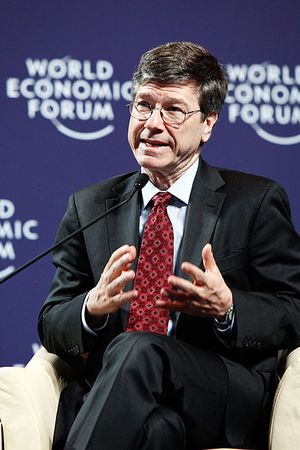Difference between revisions of "Jeffrey Sachs"
(minor additions) |
|||
| Line 13: | Line 13: | ||
==Activities== | ==Activities== | ||
| − | Sachs worked with [[Anders Åslund]] and [[David Lipton]] as a senior advisor to the Russian government under President [[Boris Yeltsin]] and Acting [[Russian Prime Minister]] [[Yegor Gaidar]] on the [[privatisation]] of the [[USSR]]. | + | Sachs worked with [[Anders Åslund]] and [[David Lipton]] as a senior advisor to the Russian government under President [[Boris Yeltsin]] and Acting [[Russian Prime Minister]] [[Yegor Gaidar]] on the [[privatisation]] of the [[USSR]], and also advised [[Poland]], [[Slovenia]], and [[Estonia]] as they were beginning their transitions to [[capitalism]]. |
| + | |||
| + | The Russian privatization was a thorough disaster, one of the worst collapses in human history. Living standards fell and the population shrank, an almost unprecedented event in a country not at war. Afterwards, most Russians regarded him as "either an emissary of [[Satan]] or of the [[CIA]]."<ref>https://leftbusinessobserver.com/Sachs.html</ref> | ||
| + | |||
| + | ==Later Career== | ||
| + | In later life, Sachs became more prominent as a critic of development orthodoxy, arguing against the [[IMF]]'s austere prescriptions after the [[1997 Asian crisis]], and pressing for [[debt relief]] for the poorest countries. Sachs has also pushed a number of initiatives, including establishing credit and [[microcredit|microloan programs]]. | ||
| + | |||
| + | During the Greek government-debt crisis in July [[2015]], Sachs, with [[Heiner Flassbeck]], [[Thomas Piketty]], [[Dani Rodrik]] and [[Simon Wren-Lewis]], published an open letter to the Chancellor of Germany [[Angela Merkel]], calling for an end to austerity measures in Greece to service debt<ref>http://www.tagesspiegel.de/politik/offener-brief-von-oekonomen-an-angela-merkel-jetzt-ist-der-zeitpunkt-die-gescheiterte-sparpolitik-zu-ueberdenken/12021886.html</ref>. | ||
{{SMWDocs}} | {{SMWDocs}} | ||
==References== | ==References== | ||
{{reflist}} | {{reflist}} | ||
{{Stub}} | {{Stub}} | ||
Revision as of 07:13, 26 December 2020
(academic) | |
|---|---|
 | |
| Nationality | US |
| Member of | Brookings Institution, Council on Foreign Relations/Members 3, Institute for New Economic Thinking, Lancet/COVID-19 Commission, Project Syndicate, The American Academy in Berlin/Distinguished Visitors, WEF/Global Leaders for Tomorrow/1995 |
| Interest of | Vuk Jeremić |
Worked on the privatisation of Russia | |
Jeffrey Sachs was a panelist of the session on Economic Relations With Eastern Europe for the 1990 Bilderberg.[1]
Contents
Activities
Sachs worked with Anders Åslund and David Lipton as a senior advisor to the Russian government under President Boris Yeltsin and Acting Russian Prime Minister Yegor Gaidar on the privatisation of the USSR, and also advised Poland, Slovenia, and Estonia as they were beginning their transitions to capitalism.
The Russian privatization was a thorough disaster, one of the worst collapses in human history. Living standards fell and the population shrank, an almost unprecedented event in a country not at war. Afterwards, most Russians regarded him as "either an emissary of Satan or of the CIA."[2]
Later Career
In later life, Sachs became more prominent as a critic of development orthodoxy, arguing against the IMF's austere prescriptions after the 1997 Asian crisis, and pressing for debt relief for the poorest countries. Sachs has also pushed a number of initiatives, including establishing credit and microloan programs.
During the Greek government-debt crisis in July 2015, Sachs, with Heiner Flassbeck, Thomas Piketty, Dani Rodrik and Simon Wren-Lewis, published an open letter to the Chancellor of Germany Angela Merkel, calling for an end to austerity measures in Greece to service debt[3].
A Document by Jeffrey Sachs
| Title | Document type | Publication date | Subject(s) | Description |
|---|---|---|---|---|
| Document:Ukraine is the latest neocon disaster | Article | 27 June 2022 | Neoconservatism Joe Biden/Presidency 2022 Russian invasion of Ukraine Robert Kagan Victoria Nuland NATO Institute for the Study of War | The same neocons who turned the Middle East into a disaster area are now creating a similar catastrophe in Ukraine – for Ukrainians and for the rest of the world, argues Prof Jeffrey Sachs<a href="#cite_note-1">[1]</a> |
Events Participated in
| Event | Start | End | Location(s) | Description |
|---|---|---|---|---|
| Bilderberg/1990 | 10 May 1990 | 13 May 1990 | New York US Glen Cove | 38th Bilderberg meeting, 119 guests |
| WEF/Annual Meeting/2011 | 26 January 2011 | 30 January 2011 | World Economic Forum Switzerland | 2229 guests in Davos, with the theme: "Shared Norms for the New Reality". |
| WEF/Annual Meeting/2013 | 23 January 2013 | 27 January 2013 | World Economic Forum Switzerland | 2500 mostly unelected leaders met to discuss "leading through adversity" |
| WEF/Annual Meeting/2014 | 22 January 2014 | 25 January 2014 | World Economic Forum Switzerland | 2604 guests in Davos considered "Reshaping The World" |
| WEF/Annual Meeting/2016 | 20 January 2016 | 23 January 2016 | World Economic Forum Switzerland | Attended by over 2500 people, both leaders and followers, who were explained how the Fourth Industrial Revolution would changed everything, including being a "revolution of values". |